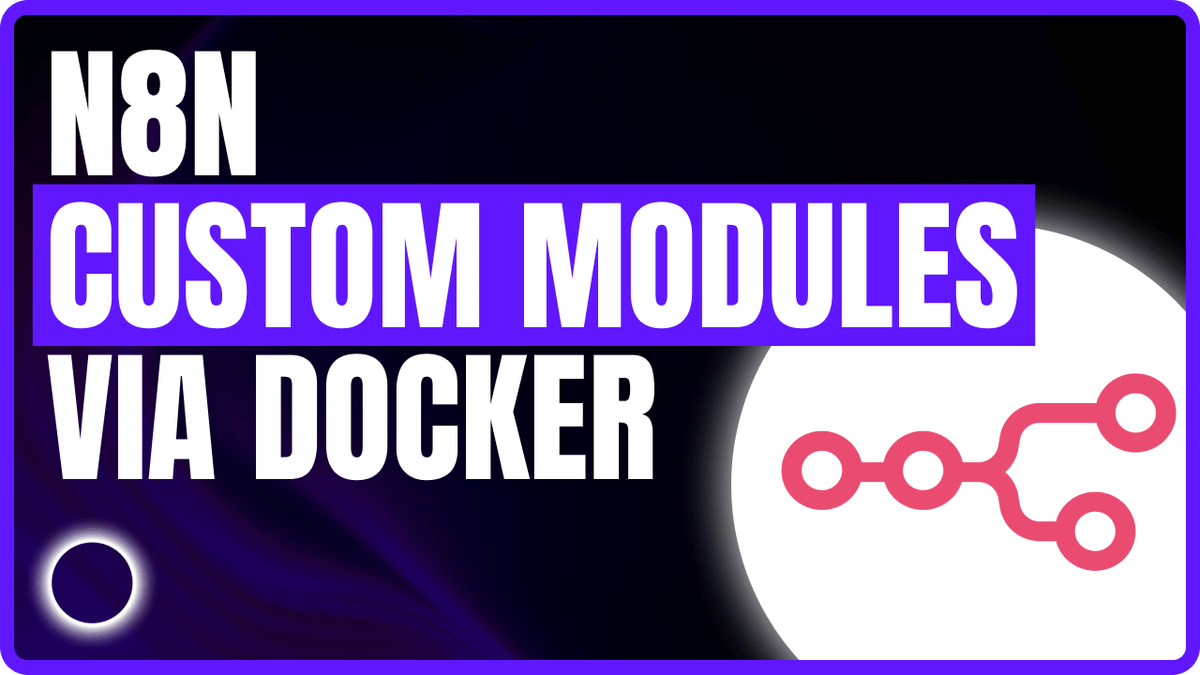How to run n8n with docker compose to use custom NPM modules
Introduction
Docker Compose provides a powerful way to run n8n with custom configurations and additional NPM modules. This guide will walk you through setting up a production-ready n8n instance using Docker Compose, complete with custom modules and advanced configurations.
For a more basic setup using Docker without custom NPM modules, see How to install n8n on a Local Server and Access it Securely from Anywhere
Prerequisites
- Docker and Docker Compose installed on your system
- Basic understanding of container orchestration
- Server with sufficient resources (minimum 2GB RAM recommended)
- Domain name configured with DNS records (for HTTPS access)
Why You Might Need to Use Docker Compose
Docker Compose becomes essential when you need to extend n8n’s capabilities with custom NPM modules. For example, in our implementation, we needed several specific tools:
- Content conversion tools (@tryfabric/martian and notion-to-md) for transforming Notion pages to JSON and HTML for websites
- Notion API client (@notionhq/client) for direct integration with Notion
- Markdown processing (markdown-it) for content formatting
- Media processing tools (ffmpeg) for extracting audio from video calls for transcription
By using Docker Compose, you can easily manage these dependencies in a reproducible way, ensuring that all necessary tools are properly installed and configured in your n8n environment. This approach offers flexibility to add any NPM packages you need for your specific automation workflows.
Project Structure Setup
First, let’s create a proper directory structure for our n8n deployment:
mkdir n8n-docker
cd n8n-docker
touch docker-compose.yml
touch Dockerfile
touch .env
Creating the Dockerfile
The Dockerfile allows us to extend the base n8n image with custom NPM packages:
FROM n8nio/n8n:latest
USER root
# Install additional npm packages
RUN npm install -g npm \
@tryfabric/martian \
notion-to-md \
# Add other packages as needed
USER node
Docker Compose Configuration
Create a comprehensive docker-compose.yml file that includes all necessary configurations:
version: '3.8'
services:
n8n:
container_name: n8n
build: .
restart: always
ports:
- "5678:5678"
environment:
- NODE_FUNCTION_ALLOW_EXTERNAL=*
- N8N_HOST=${N8N_HOST}
- N8N_PORT=5678
- N8N_PROTOCOL=https
- NODE_ENV=production
- WEBHOOK_URL=https://${N8N_WEBHOOK_URL}/
- N8N_ENCRYPTION_KEY=${N8N_ENCRYPTION_KEY}
# Email configuration
- N8N_EMAIL_MODE=${N8N_EMAIL_MODE}
- N8N_SMTP_HOST=${N8N_SMTP_HOST}
- N8N_SMTP_PORT=${N8N_SMTP_PORT}
- N8N_SMTP_USER=${N8N_SMTP_USER}
- N8N_SMTP_PASS=${N8N_SMTP_PASS}
- N8N_SMTP_SENDER=${N8N_SMTP_SENDER}
volumes:
- n8n_data:/home/node/.n8n
- ${DATA_FOLDER}/files:/files
networks:
- n8n-network
networks:
n8n-network:
driver: bridge
volumes:
n8n_data:
external: true
Important: The environment variable NODE_FUNCTION_ALLOW_EXTERNAL=* is crucial for this setup to work properly. This setting allows n8n to use external NPM modules in your workflows. Without this configuration, any custom NPM packages installed in the Dockerfile will not be accessible within n8n functions.
Make sure to include
NODE_FUNCTION_ALLOW_EXTERNAL=*in your environment variables. This is a required setting when working with custom NPM modules, and your workflows may fail if this is not properly configured.
Environment Configuration
Create a .env file with your specific configurations:
# Base Configuration
DATA_FOLDER=/path/to/your/data
N8N_HOST=your-domain.com
N8N_WEBHOOK_URL=your-domain.com
N8N_ENCRYPTION_KEY=your-secure-encryption-key
# Email Configuration
N8N_EMAIL_MODE=smtp
N8N_SMTP_HOST=smtp.provider.com
N8N_SMTP_PORT=587
N8N_SMTP_USER=your-smtp-user
N8N_SMTP_PASS=your-smtp-password
N8N_SMTP_SENDER=Your Name <[email protected]>
Deployment Steps
1. Initialize the Volume
Create the external volume for persistent data storage:
docker volume create n8n_data
2. Build and Deploy
Start the n8n container with Docker Compose:
docker compose up -d --build
Maintenance and Updates
Updating n8n
To update your n8n installation:
# Pull the latest images
docker compose pull
# Rebuild and restart containers
docker compose down
docker compose up -d --build
Backup and Restore
Regular backups are crucial. Here’s how to backup your n8n data:
# Backup
docker run --rm -v n8n_data:/source -v $(pwd):/backup alpine tar czf /backup/n8n-backup.tar.gz -C /source .
# Restore
docker run --rm -v n8n_data:/target -v $(pwd):/backup alpine sh -c "cd /target && tar xzf /backup/n8n-backup.tar.gz"
Advanced Configurations
Custom NPM Modules
To add new NPM modules, update your Dockerfile and rebuild:
# Update Dockerfile with new packages
docker compose down
docker compose up -d --build
Troubleshooting
- Container won’t start: Check logs using
docker compose logs n8n - Permission issues: Ensure proper volume permissions and ownership
- Network connectivity: Verify network configuration and firewall settings
Security Best Practices
- Always use HTTPS in production
- Regularly update all components
- Use strong encryption keys
- Implement proper access controls
Conclusion
Running n8n with Docker Compose provides a robust, scalable, and maintainable automation platform. This setup enables you to leverage custom NPM modules while maintaining a production-ready environment with proper security measures and backup procedures.

